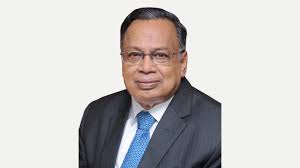
SANGSAD BHABAN, June 29, 2024 (BSS) - Finance Minister Abul Hassan Mahmood Ali today hoped that the general point to point inflation rate would come down at 6.5 percent in the next fiscal year (FY25) due to various steps and strategies of the government.
"Keeping in line with the contractionary initiative of the monetary policy, we've adopted supportive strategies in the revenue policy like reducing budget deficit, discouraging less important expenditures and pursuing austerity in various sectors," he said.
The Finance Minister said this while delivering his winding up speech on the Finance Bill of the proposed budget for fiscal year 2024-25 at Jatiya Sangsad this afternoon.
He said the government has put highest priority on restoring macroeconomic stability including containing inflation in the budget considering the facts that Bangladesh is facing various challenges like other countries of the world due to global crisis.
Ali said it is undeniable that adoption of contractionary policy in the long run to control inflation can slow down growth. "While there is a need to adopt contractionary policy to control inflation, it is undeniable that in the long run this approach can slow down growth," he said.
But, he noted that to build a developed, prosperous, smart Bangladesh by 2041, Bangladesh needs high growth on a continuous basis. "In this context, we framed this budget with the difficult challenge of balancing the seemingly contradictory goals of achieving economic stability and sustaining growth," he said.
Ali strongly hoped that under the able, experienced and pragmatic leadership of the Prime Minister, the government can bridge the gap between aspirations and capabilities and thus return to the path of high growth soon.
The Finance Minister said that in the proposed budget, the government has tried to provide necessary allocations in education, health, agriculture, local government and rural development, electricity, communication, science and technology sectors with the aim of building a smart Bangladesh.
"Besides, we've given due importance on ensuring food safety," he added. Therefore, he said that in this proposed budget, the government has given the highest priority to bringing macroeconomic stability along with containing inflation.
"In the Monetary policy, various contractionary steps have been taken to control inflation; the policy rate (repo) has been raised significantly to 8.5 percent and bank interest rates have been made fully market-based," he added.
Moreover, Ali said that a crawling peg system has been introduced in the dollar exchange rate to increase foreign currency reserves by encouraging exports and accelerating remittances.
In the proposed budget, he said the government has planned to mobilise resources on a priority basis for investment and employment-supporting infrastructures development. "As a result of these initiatives, we expect GDP growth to reach 6.75 percent in the next financial year and 7.25 percent in the medium term," he said.
He mentioned that the government is also taking multifaceted steps to collect resources to meet the government expenditure. "Before deciding the revenue collection policy, we've reviewed in details the proposals received from discussions with various public and private organisations, business organisations and stakeholders," he added.
Ali said that to sustain the pace of development, the government has adopted various strategies to increase tax collection, including reducing tax evasion, with an emphasis on increasing the tax-GDP ratio. "We're undertaking various reforms in revenue management to increase revenue in the medium term by solving existing challenges in revenue collection," he said.
At the same time, he said the government is reforming the national customs policy keeping in mind the reality of the post transition from the list of least developed countries in 2026. "Reliance on import duties is being reduced to help reduce anti-export bias," he observed
He said although the rise in overall allocations in the proposed budget for FY25 is 11.6 percent higher than the revised budget for FY24, but the allocations against education and technology sectors in the fresh budget witnessed 25 percent growth while it witnessed 39 percent growth in the health sector.
In order to expedite the process of poverty alleviation, he said that the coverage and depth of the social safety nets have been widened continuously as allocations against the social safety nets have been increased by 12.2 percent in the next fiscal year to Taka 1,36,026 crore.
Turning to the benefits of the universal pension scheme, Ali said that such scheme would be one of the most attractive schemes in the world.
The Finance Minister said that Prime Minister Sheikh Hasina, who is the inheritor of the Father of the Nation's eternal ideals, is carrying out the unfinished tasks of the Father of the Nation one by one, taking alongside all people of the country with invincible conviction after overcoming hundreds of thousands of setbacks.
"With the hands of the Prime Minister and the path shown by her, we will achieve the sustainable development goals by 2030 and join the ranks of high-middle income countries by 2031 and thus we'll be able to establish a developed-prosperous-smart Bangladesh by 2041, Insha’Allah,” he said.